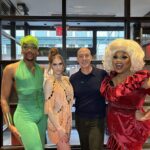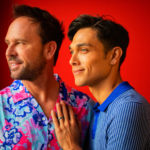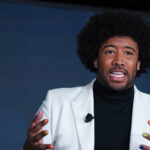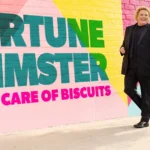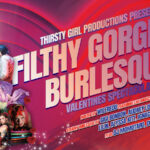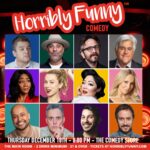There are cinephiles, and then there are cinephiles. Alonso Duralde’s entire life is centered on films. He is the chief U.S. film critic of The Film Verdict, he co-hosts the Linoleum Knife, Maximum Film!, and Breakfast All Day podcasts, and appears regularly on Deck the Hallmark pod – all having to do with some genre of films, of course. If that weren’t enough podcasts about movies, he launched The Film Library with Kanopy.com, discussing films that matter from the platform’s library of over 30K movies, all free to students and library card holders. His extensive knowledge of all things films has made him an expert commentator on CNN, PBS, TCM, and ABC, to name a few, as well as appearing in numerous documentaries. To celebrate this year’s Pride, Alonso released perhaps his most ambitious book to date, Hollywood Pride: A Celebration of LGBTQ+ Representation and Perseverance in Film. The book catalogs the life stories and movies of Hollywood’s queer contingent from behind and in front of the camera, from Thomas Edison’s first ever captured sound film to our current boom in LGBTQ representation.
Alonso Duralde’s name reads like a leading man’s credit and comes from Spanish immigrants. In a story that could be its own film, his parents, his father a doctor and his mother a nursing student, started dating in Madrid. His father was brought to Emory University in Atlanta for a temporary fellowship. Falling in love with the United States and not wanting to return to a post-World War II Spain, he proposed by mail and sent for her. At that time, an unmarried woman could not travel transatlantically by boat alone. As a workaround, Alonso’s mother got married in Spain with her brother standing in for her future husband. As a precaution, a priest at Emory married them again for safe measure. Alonso is the youngest of seven children, and he credits growing up with older siblings for his accelerated speech and reading skills. His love for films would start as a kind of family affair.
When I was a kid, I was just barely going along for the ride. My mom really liked movies. She was a big Humphrey Bogart fan, she really liked Clark Gable. So, the TV would be on older movies with some frequency. I was a “change of life” baby, so, my oldest brother, who is 12 years older than me, graduates from college in the mid-seventies and comes home from Harvard with all of these books about MGM and Greta Garbo and classic movies of the thirties and forties because there was a big revival of that kind of thing happening. In the Ivy League in the early seventies, that’s where this sort of Casablanca revival happened. So, he brings these books home and I devour them, baby nerd that I am at nine years old. Then it’s like marking the TV Guide every week because this is still pre-cable, pre-VHS, and I’m just looking for when the afternoon movie is going to be a Hitchcock flick or whatever.
The gay community has often had a close relationship with the dramatic and camp films of classic Hollywood, celebrating the divas of the time. For Alonso, he did not immediately correlate the two.
It didn’t occur to me that there was anything connected between the two for a long time. Of course, a nine-year-old who’s watching All About Eve on TV, what could be gay about that? I was the high school kid standing in the library reading Vito Russo’s The Celluloid Closet next to the shelf, and then putting it back on the shelf before anybody saw you. I was not going to check it out. I wasn’t going to take it, but I would stand in the stacks and just start devouring it. So that was my first inkling that there was a connection there.
And as far as Hollywood divas like Louise Brooks, Joan Crawford, Bette Davis, Norma Shearer, with the list going on and on, why does Alonso think they resonate and are venerated by the gay community so much?
My personal theory is, for little gay kids, there’s something about a diva that is an example of strength that isn’t tied into a kind of machismo. So in other words, if Mary Tyler Moore can walk into a room and own that room because of her magnetism and her sense of humor, and whatever it is that is compelling and making people pay attention, that’s something that if you are a kid who can’t throw a ball and doesn’t want to go hunting with your dad and doesn’t want to do the traditional stuff, gay kids get that from divas. Straight kids get that from Charles Bronson. Straight kids get that from football heroes.
Alonso’s coming out would come during his last semester in college. His siblings were all grown up and moved out of the voice, he had found his individual voice in school, and he was no longer fighting for scraps at the table.
I was thinking, alright, if my parents disowned me, at least my education would have been paid for. And they didn’t. And they were great. I mean, my mom had passed away by that point, but my dad, after a few rough patches, was terrific. You got to map these things out, so that was my strategy. I came out, I got a boyfriend, the whole thing.
I remember before coming out, I remember seeing both My Beautiful Laundrette and Prick Up Your Ears with my best, straight friend to whom I was not yet out. I remember just sitting through both of those movies being like, okay, do not respond to anything, just trying to keep this game face on. And then right after coming out, I remember seeing Parting Glances for the first time. That movie really resonated for me because by that point, I had a boyfriend. We’d moved in together and there was a scene, just a little throwaway moment early in the movie, of the two lead characters. One of them has been jogging around Central Park, the other’s sitting on a park bench reading and they go back to their apartment and start making love. They’re making out and they fall backward on the bed and the camera pans down and you see one of them use his feet to remove the other one’s shoes. And I was like, ooh, I’ve done that, that’s me! I felt recognized in a movie in that way for the first time. I’d been watching love stories my whole life, but I was finally in one. So that was very exciting.
Alonso started writing reviews for his high school and college paper, then for the Nashville Banner after graduating, and then came to review for Dallas’ gay paper, The Voice. He was developing his critic’s voice, learning how to mesh his knowledge and opinions in an artful and sincere way.
There’s that thing that critics have to sort of figure out and I think we spend most of our careers trying to figure out how to do it, which is the mixture of – this is what I understand as somebody who has studied the art form and is interested in the art form and knows the history of it, and has watched a lot of things, but also this is what I bring to the table as a human being who has gone through whatever things in life that color my judgment or that make me like or dislike certain things, or that make me relate to certain things. It was just more of a question of trying to get better as a writer and reading other critics and looking back at my stuff and thinking, oh, that was good, or oh, that was terrible. I am very tough on my own copy, but usually when it’s far too late to do anything about it.
Alonso maintains that even with having to see the required number of movies in a week to review, he still can sit back and enjoy a movie without making work. As he puts it, he has made his avocation his vocation. He also does not believe in guilty pleasure movies, if it gives you pleasure it gives you pleasure. He is not snobbish in his film tastes, even if a lot of his viewings take him to the Egyptian Theatre, the Academy Museum, or the New Beverly Cinema in Los Angeles. Take for instance his love of Hallmark movies. He’s authored the books Have Yourself a Movie Little Christmas and I’ll Be Home for Christmas Movie.
I watch a lot of Hallmark Christmas movies. People know this about me. It is not a secret. I’m not going to say those are cinema, but they do give me pleasure. The thing about Hallmark Christmas movies, as I always like to remind people, this is a network that is owned by a greeting card company. And in the same way that when you get a greeting card that has a beautiful snowy scene on the front, then you put it up on the mantle and you look up occasionally and you go, oh yeah, the snow, it’s Christmas, these movies kind of serve that purpose. They’re there to be on your screen and you look up and you see people making cookies or lighting a tree or shopping for a wreath or whatever, and you go, oh, it’s Christmas. And that’s, that’s it. That’s the function they serve. And if occasionally we get more than that, great, that’s a bonus. They are there to be the thing you’re paying the third most attention to. I genuinely love them. I started watching them when politics really just started taking a turn in this country, so circa 2015. They have really been my Xanax ever since; they are my place to go. When I am very decidedly not watching the news, I am probably watching a Hallmark Christmas movie.
 In his book Hollywood Pride, Alonso not only highlights the major studio films that made a mark in our queer history but also important independent pieces that were being put out by our community, even from the gay erotica world of adult films.
In his book Hollywood Pride, Alonso not only highlights the major studio films that made a mark in our queer history but also important independent pieces that were being put out by our community, even from the gay erotica world of adult films.
If you wanted to see a portrayal of gay life, whether it was urban life or in the country or whatever in the early seventies, the place you were going to find it was in gay adult cinema. In the kind of what I call the pre-VHS era, there was an attempt to tell certain kinds of stories and present certain kinds of characters because it’s not like Stonewall suddenly made gay people happen. We’d been around, there was this kind of growing subculture. And there is always a hunger, I think, for people to see their lives reflected back to them on the screen. We all crave that for movies, whether it’s aspirational or vicarious, we want that feeling of being involved with the story and figuring out how would that be me in this situation. I think before there were actual, queer, independent films before studios, heaven forbid, wanted to have leading characters, porn is where you found it.
As a queer man, going from secretly reading The Celluloid Closet to adding his own book to a detailed and well-presented queer cinematic history, he still believes that we should be holding all queer content to mainstream film standards.
As one friend of mine says 85% of everything is crap. [Laughs] But as there were more and more films, that meant that the 15% was growing, and it also meant the 85% was growing. So, there was more stuff to sift through to find what the gems were. And I think there are accommodations you can make. You can have a film that is well acted and well written, but if the lighting is subpar, you’re like, okay, well yeah, it doesn’t look great, you’re going to go for the story, go for the characters. But I don’t think that people should be giving art a pass for existing.
For Alonso, the power of and need for independent filmmaking will always be constant.
I think that television is allowed to take more chances because it’s cheaper, and it’s focused on certain markets. Whereas I think studio filmmaking, for the most part, especially the current state of studio filmmaking where they aren’t interested in making a $25 million drama aimed at adults, they want to make a $250 million superhero movie aimed at everybody. They want that movie to open in all parts of the world, including ones where any kind of content gets banned or censored. I don’t think we can ever rely on the mainstream to sweep in and tell our stories for us. I think that independent cinema is always going to be important and necessary, and it’s where we’re going to get, I think, the truest depictions of our lives and who we are. That isn’t necessarily going to be marketable to a large audience, but it’s going to be art that the people making it felt they had to make.
Very aptly, the release of Hollywood Pride coincided with the beginning of Pride season. The book is as accessible to a film guru as it is for someone who is new to studying cinematic and queer history. Unlike other books that dwell on the same Hollywood stories as Cary Grant or Marlon Brando or James Dean’s alleged homo or bisexuality, Alonso dives into a deeper history through all genders of filmmakers, actors, costume designers, directors, and more that have all played a part in creating the foundation for our cinematic legacy today. He reveals queer sensibilities that were layered into some of the biggest films, including a detail of how most of Alfred Hitchcock’s pieces were entwined with queer texture. He talks about cinematic figures that you may have not heard of before. Alonso also mixes in world and civil rights history, showing the perseverance the queer community has had in order to overcome censorship, oppression, ostracization, and the AIDS epidemic. We still had our stories told, and we still earned our place in mainstream cinema, even if we had to be sneaky or smarter about doing it. The book couldn’t come at a more perfect time when our validity and equality are being called into play politically and socially.
There’s a saying that the personal is political, but not everybody knows that or understands that. I think that there are a lot of people who can see a movie like The Birdcage and find it amusing and think, oh, those two men are so sweet or whatever, and then not really think about the fact that, oh, I’m now going to go vote for this guy who’s going to strip them of their rights. I think that’s a connection that we have to make with people. And I think that one of the most effective things that queer people can do with the people in their lives, the people who love them, is sort of gently say like, look, I know we don’t have the same opinions about everything, and I know that we don’t necessarily agree politically, but you need to understand that voting for this person has a real impact on my life in a negative way. This person is out to destroy what my partner and I have built. That’s why Harvey Milk and everybody’s always talked about why it’s so important to come out. It’s very easy for people to think of queer people as this amorphous “them.” They’re out there and they’re a threat to my family, and they want bad things, and they are whatever. But when “them” becomes my cousin Frank, that changes everything. And so, I think it’s up to cousin Frank to then tell the rest of the family, look, I need you to understand that this politician that you support for whatever other reasons you might like, is going to mess my life up in a serious way and I need you to really think twice about what you’re doing when you vote for him. And what that says to me.
Hollywood Pride: A Celebration of LGBTQ+ Representation and Perseverance in Film is available on Amazon and wherever you get books.
Check out Alonso’s latest podcast, The Film Library wherever you get podcasts, and check out Kanopy.com extensive library of LGBTQ titles and beyond for free with a library card.
Last modified: October 18, 2024





